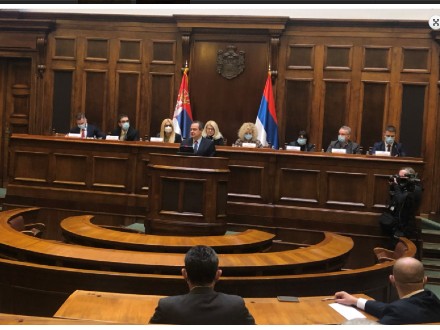The Committee on Finance, State Budget and Public Spending Control organized a public hearing on the bills on fiscalization and digital assets. A public hearing is an institute providing information or professional opinions on bills in the parliamentary procedure, clarification of provisions and issues of importance for preparing the proposals of acts and of monitoring the implementation and application of legislation.
Speaker of the National Assembly of the Republic of Serbia Ivica Dačić greeted the attendants of the First Public Hearing held in the new legislature of the National Assembly, emphasizing that public debates were an example of good practice. In his introductory address, Dačić said that the institute of public hearings was an important instrument of parliamentary practice which represented a significant step forward in the supervision of work of ministers and other civil servants compared to the traditional type of supervision achieved mainly via parliamentary questions.
The Bill on Digital Assets was presented by the State Secretary in the Ministry of Finance Saša Stevanović. He said that the regulations in this area were still in development, both globally and at the level of the European Union. He said that the Republic of Serbia recognized global trends and following the examples of certain jurisdictions, such as France and Malta, decided to systematically approach regulations in this area through legislation. The adoption of inciting, encouraging, stimulating, and globally competitive Law on Digital Assets is expected to promote growth of domestic start-ups in the field of blockchain technology, and facilitate financing of innovative ideas. The State Secretary said that at that moment digital assets were explicitly regulated only by the Law on Prevention of Money Laundering and Terrorist Financing, exclusively for the purpose of preventing criminals and their groups from abusing virtual currencies in their illegal activities.
Marko Janković Chairman of the Securities Commission provided a rationale for the drafting of the law, from a perspective of the capital market’s regulator. All the institutions which participated in the work group wanted to place the Republic of Serbia in the ranks of the countries with the most modern solutions in the field of digital assets and to bring Serbia to a position of leadership when it comes to digital assets regulation. This in turn is expected to spur the development of the Serbian economy.
The adoption of the law is is expected by the end of 2020.
Speaker of the National Assembly of the Republic of Serbia Ivica Dačić greeted the attendants of the First Public Hearing held in the new legislature of the National Assembly, emphasizing that public debates were an example of good practice. In his introductory address, Dačić said that the institute of public hearings was an important instrument of parliamentary practice which represented a significant step forward in the supervision of work of ministers and other civil servants compared to the traditional type of supervision achieved mainly via parliamentary questions.
The Bill on Digital Assets was presented by the State Secretary in the Ministry of Finance Saša Stevanović. He said that the regulations in this area were still in development, both globally and at the level of the European Union. He said that the Republic of Serbia recognized global trends and following the examples of certain jurisdictions, such as France and Malta, decided to systematically approach regulations in this area through legislation. The adoption of inciting, encouraging, stimulating, and globally competitive Law on Digital Assets is expected to promote growth of domestic start-ups in the field of blockchain technology, and facilitate financing of innovative ideas. The State Secretary said that at that moment digital assets were explicitly regulated only by the Law on Prevention of Money Laundering and Terrorist Financing, exclusively for the purpose of preventing criminals and their groups from abusing virtual currencies in their illegal activities.
Marko Janković Chairman of the Securities Commission provided a rationale for the drafting of the law, from a perspective of the capital market’s regulator. All the institutions which participated in the work group wanted to place the Republic of Serbia in the ranks of the countries with the most modern solutions in the field of digital assets and to bring Serbia to a position of leadership when it comes to digital assets regulation. This in turn is expected to spur the development of the Serbian economy.
The adoption of the law is is expected by the end of 2020.

